The pristine, two-bedroom house, in a new still-under-construction neighborhood, is a symbol of the hard work and relentless determination of Darren Larson. Larson has cerebral palsy (CP), and his home was designed with his needs in mind. Walls come together at 45-degree angles to open up floor space for his power chair. The front door opens at the touch of a button attached to his chair. The outlets are high on the walls, the thermostat low to better accommodate his reach. “Things have worked out well for me,” Larson said recently while giving a tour. “I feel very blessed.”
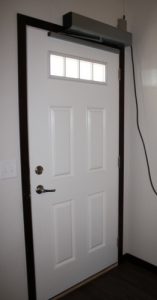
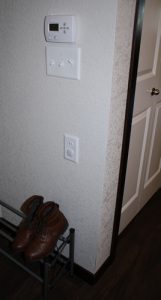
Was growing up in a small, rural town with significant physical challenges difficult? “Nothing is as simple as we want it to be,” Larson responded. “That’s a complicated question. Everyone knew me. Everyone treated me well. But, because I had a physical disability I could not drive, which was a major, major lesson in life.” Any social occasions had to be planned. “You couldn’t say, ‘Let’s cut out of class and go be bad kids,’” Larson recalled. “Those experiences passed me by. It was no fault of mine, no fault of anyone. It’s just the reality of small town America and not having transportation systems set up. But you find yourself through independence. I never really had the freedom to find myself.”
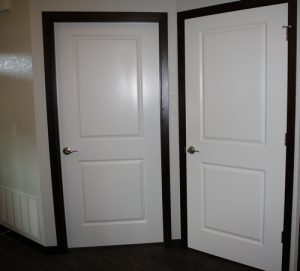
But home in Eureka was comfortable, and felt safe. Leaving after high school was scary and uncertain. Larson and his mother had the help of Home and Community-Based Services (HCBS) to help guide them through the transition. Through HCBS and Vocational Rehabilitation (VR) in Kalispell, with support and guidance from teachers and staff at Lincoln County High School, Larson explored the possibility of attending college. As a senior, Larson and his mom traveled to Missoula for several days of VR assessments to see if spending money to send Larson to college would be a good use of resources. “That’s a lot of pressure,” Larson said. “If you don’t do good on these tests, we won’t provide you with money to go to school.”
The pressure to do well got to Larson. After the assessments, the test analyst did not recommend him for college. “That was a very difficult meeting,” Larson said. “My VR counselor said, ‘OK. I don’t care what she says. We are going to get you the resources you need to get you to college. I’ve known you for years and I know your motivation.’ That was inspiration, knowing people really cared, that the judgement of the assessments was dismissed because of relationship.”
Larson graduated from the University of Montana in 2006 with a 3.3 GPA and a bachelor’s degree in political science. “That showed I was college material!” he said with a grin.
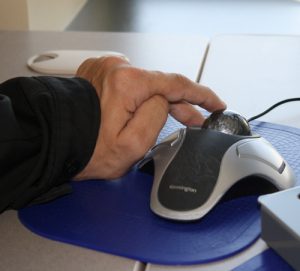
These days, Larson is the Community Relations Coordinator for Consumer Direct Care Network. He manages the company’s social-media sites and blogs for 13 different company web sites. To do his work, Larson utilizes a power chair that lifts and lowers as needed, a track-ball mouse, a key guard on his keyboard, and Word Prediction (which doubles the words per minute he can type). Larson has found a good niche at Consumer Direct. “I am so blessed to have the team I have,” he said during a recent visit to his office. “They never pressure me. I am by far my worst critic. I pressure myself because I’m slow.”
Larson also actively campaigns for disability rights. This legislative session he spoke to various committees in Helena four times, advocating for the rights (and wages) of consumers and caregivers.
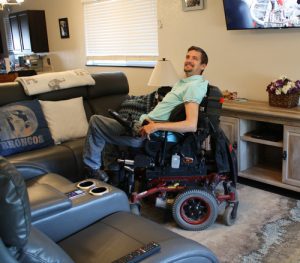
Larson has a job he loves, co-workers he enjoys and respects, and a new home. He also has some advice for parents and support teams: “Try your best not to limit possibilities,” he said. “People are designed to overcome challenges. We are given a blank canvas, and we can paint a beautiful picture. You cannot paint it for us. Let us see what is possible.”

